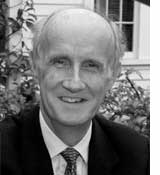 |

Friday Evening Lecture Series
 07/04/03 07/04/03
Climate Change and Human Health: The Picture Begins to Clarify
Anthony J. McMichael, Director, National Centre for Epidemiology and Population Health, Australian National University
Introduction by Christopher Neill, Assistant Scientist, The Ecosystems Center, Marine Biological Laboratory
Lecture Abstract:
The increasing global temperature over recent decades suggests that human-induced global climate change is now real. Many non-human physical and biological systems have recently undergone alterations apparently due to warming. The human species is better buffered against environmental stressors than are other plant and animal species. So: when, and where, might we expect to see human health impacts?
There is a wide range of expected health impacts of climate change. Most entail changes in the frequency or severity of familiar health risks—such as those due to floods, storms, and fires; the mortality toll of heat waves; the range and seasonality of infectious diseases; agricultural productivity; reduced freshwater supplies; and the repercussions of economic dislocation and population displacement. Most such health impacts will be adverse.
Some evidence suggests—as yet inconclusively—that climate change is already affecting aspects of human health. The pattern of some vector-borne infectious diseases has recently changed in climate-attributable fashion. Per-capita cereal grain yields have declined for the past half-decade. Extreme, hazardous weather events appear to have increased in tempo.
We cannot await conclusive evidence before developing adaptive strategies to lessen population vulnerability. Climate change is weakening some of Earth’s life-support systems, and we should therefore take seriously the need for both preventive and adaptive actions.
Tony (A.J.) McMichael directs the National Centre for Epidemiology and Population Health, at The Australian National University, Canberra, Australia. From 1994 until 2001, he was Professor of Epidemiology at the London School of Hygiene and Tropical Medicine, UK. His research interests over three decades have spanned occupational diseases, dietary influences on chronic diseases, environmental epidemiology and, more recently, the population health consequences of global environmental change. From 1993 to 2001, he chaired the assessment of health impacts for the UN’s Intergovernmental Panel on Climate Change (IPCC). He is an advisor to various UN and other international agencies in relation to issues of environmental change, sustainable development, human wellbeing and health. His recent book, "Human Frontiers, Environments and Disease: Past Patterns, Uncertain Futures", was published in 2001, by Cambridge University Press.
Christopher Neill will introduce Dr. McMichael. After earning his B.S. in 1980 from Cornell University in Ithaca, New York, Neill went on to the University of Massachusetts, Amherst, where he received his M.S. in 1988 and his Ph. D. in 1992. He joined the staff of The Ecosystems Center as a Post-Doctoral Research Associate in 1991 and as an Assistant Scientist in 1997. Neill’s research focuses on how changes in land use and other human activities alter ecosystem nutrient cycles and the movement of nutrients from land to water. In the Amazon, he examines how tropical forest clearing for cattle and an emerging trend toward intensification of agriculture alter the emissions of greenhouse gases from soils and nitrogen runoff to streams and rivers. In a project on Martha's Vineyard, he works with The Nature Conservancy to study how experimental forest clearing and prescribed burning can be used to increase the presence of rare plant species, and how these land uses influence ecosystem properties, including recharge of groundwater and the movement of nitrogen to coastal ponds.
|